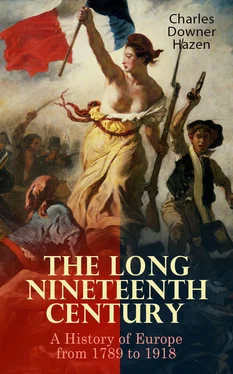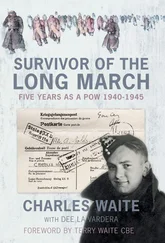They wished also a social revolution. Well educated, saturated with the literature of the period, which they read with avidity, their minds fermented with the ideas of Voltaire, Rousseau, Montesquieu, and the economists. Personally, man for man, they were as cultivated as the nobles. They wished social equality, they wished the laws to recognize what they felt the facts proved, that the bourgeois was the equal of the noble. They chafed under pretensions which they felt unjustified by any real superiority. Their mood was brilliantly expressed by a pamphlet written by one of their members, the Abbe Sieyes, which circulated enormously on the eve of the Revolution. "What is the Third Estate?" asked Sieyes. "Everything. What has it been in politics until now? Nothing. What does it desire? To become something." Belonging to this estate but beneath the bourgeoisie were the artisans perhaps two million and a half, living in the towns and cities. They were a comparatively small class because the industrial life of France was not yet highly developed. They were generally organized in guilds which had their rules and privileges that gave rise to bickerings galore and that were generally condemned as preventing the free and full expansion of industry and as artificially restricting the right to work.
The other large division of the third estate was the peasantry. This was by far the largest section. Indeed it was the nation. France was an agricultural country, more than nine-tenths of the population were peasants, more than 20,000,000. About a million of them were serfs, the rest were free men, yet their lot was an unhappy one. The burdens of society fell with crushing weight upon them. They paid fifty-five per cent of what they were able to earn to the state, according to the sober estimate of Turgot. They paid tithes to the clergy and numerous and vexatious feudal dues to the nobles. The peasant paid tolls to the seigneur for the use of the roads and bridges. When he sold his land he paid a fee to the former seigneur. He was compelled to use the seigneur's wine press in making his wine, the seigneur's mill, the seigneur's oven, always paying for the service. The loss of money was one aspect of the business, the loss of time another. In some cases, for instance, the mill was four or five hours distant, and a dozen or more rivers and rivulets had to be crossed. In summer, even if the water was too low to turn the wheel, nevertheless the peasant was obliged to bring his grain to be ground, must wait perhaps three days or must pay a fee for permission to have the grain ground elsewhere. Adding what he paid to the king, the Church, and the seigneur, and the salt and excise duties, the total was often not far from four-fifths of his earnings. With the remaining one-fifth he had to support himself and family.
The inevitable consequence was that he lived on the verge of disaster. Bad weather at a critical moment supervening, he faced dire want, even starvation. It happened that the harvest was bad in 1788 and that the following winter was cruelly severe. According to a foreign ambassador water froze almost in front of the fireplace. It need occasion no surprise that owing to such conditions hundreds of thousands of men became beggars or brigands, driven to frenzy by hunger. It has been estimated that in Paris alone, with a population of 650,000, there were nearly 120,000 paupers. No wonder there were abundant recruits for riots and deeds of violence. The 20,000,000 peasants, who knew nothing of statecraft, who were ignorant of the destructive and subversive discontented theories of Voltaire and Rousseau, were daily and hourly impressed with the imperative necessity of reforms by the hard circumstances of their lives. They knew that the feudal dues would have to be abolished, that the excessive exactions of the state would have to be reduced before their lives could become tolerable. Their reasons for desiring change were different from those of the other classes, but it is evident that they were more than sufficient.
The combined demand for reform increased as time went on and swelled in volume and in intensity. The voice of the people spoke with no uncertain sound.
Such was the situation. On the eve of the Revolution Frenchmen enjoyed no equality of status or opportunity but privileges of the most varied kinds divided them from each other.
They also enjoyed no liberty. Religious liberty was lacking. Since the revocation of the Edict of Nantes in 1685 Protestantism had been outlawed. It was a crime punishable with hard labor to practise that religion. Under Louis XVI the persecution of Protestants was in fact suspended, but it might be resumed at any moment. Protestant preaching was forbidden and consequently could occur only in secret or in lonely places. Jews were considered foreigners and as such were tolerated, but their position was humiliating. Catholics were required by law to observe the requirements and usages of their religion, communion, fast days, Lent. The Church was absolutely opposed to toleration and because of this incurred the animosity of Voltaire.
There was no liberty of thought, or at least, of the expression of it. Every book, every newspaper article must be submitted to the censor for approval before publication, and no printer might print without permission. Even when published in conformity with these conditions books might be seized and burned by the police, editions destroyed when possible, and publishers, authors, readers might be prosecuted and fined or imprisoned. Let no one think that the mere fact that Rousseau, Voltaire, and the other authors of the day were able to get their thoughts before the public proves that liberty existed in practice, even if not in theory. Voltaire knew imprisonment for what he wrote and was virtually exiled during long years of his life. The censorship was applied capriciously but it was applied sufficiently often, and prosecutions were sufficiently numerous to justify the statement that liberty was lacking in this sphere of life.
There was no individual liberty. The authorities might arrest any one whom they wished and keep him in prison as long as they chose without assigning reasons and without giving the victim any chance to prove his innocence. There was no such thing as a Habeas Corpus law. There was a large number of state prisons, the most famous being the Bastille, and many of their occupants were there by reason of the lettres de cachet, or orders for arbitrary arrest, one of the most odious and hated features of the Old Regime. Ministers and their subordinate officials used these letters freely. Nobles easily obtained them, sometimes the place for the name being left blank for them to fill in. Sometimes, even, they were sold. Thus there was abundant opportunity to use them to pay off merely personal grudges. Malesherbes once said to Louis XVI, "No citizen of your realm is sure of not seeing his liberty sacrificed to private spite, the spirit of revenge: for no one is so great as to be safe from the hatred of a minister, so little as to be unworthy of that of a clerk." Lettres de cachet were also used as a measure of family discipline, to buttress the authority of the head of the family, which was quite as absolute as it is in the Orient. A father could have his wife imprisoned or his children, even though they were adults. Mirabeau had this experience even when he was already widely known as a writer on public affairs.
Nor was there political liberty. The French did not have the right to hold public meetings or to form associations or societies. And of course, as we have seen, they did not elect any assemblies to control the royal government. Liberties which had been liberty in vogue in England for centuries, which were the priceless heritage of the English race on both sides of the Atlantic, were unknown in France.
In view of all these facts it is not strange that Liberty and Equality became the battle cry of the Revolution, embodying the deepest aspirations of the nation.
Читать дальше












